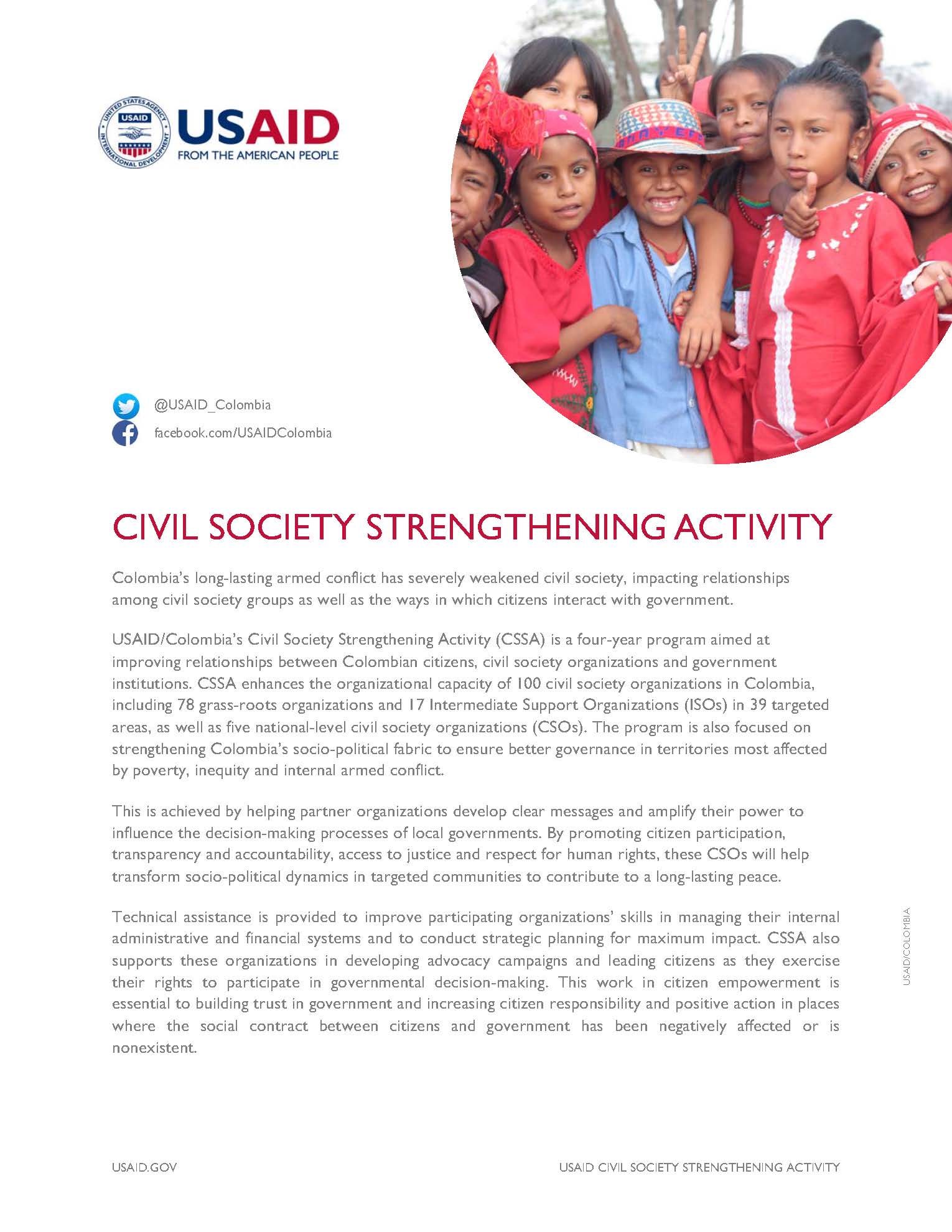Civil Society Strengthening Activity ![]() (pdf - 117k)
(pdf - 117k)
Colombia’s long-lasting armed conflict has severely weakened civil society, impacting relationships among civil society groups as well as the ways in which citizens interact with government.
USAID/Colombia’s Civil Society Strengthening Activity (CSSA) is a four-year program aimed at improving relationships between Colombian citizens, civil society organizations and government institutions. CSSA enhances the organizational capacity of 100 civil society organizations in Colombia, including 78 grass-roots organizations and 17 Intermediate Support Organizations (ISOs) in 39 targeted areas, as well as five national-level civil society organizations (CSOs). The program is also focused on strengthening Colombia’s socio-political fabric to ensure better governance in territories most affected by poverty, inequity and internal armed conflict.
This is achieved by helping partner organizations develop clear messages and amplify their power to influence the decision-making processes of local governments. By promoting citizen participation, transparency and accountability, access to justice and respect for human rights, these CSOs will help transform socio-political dynamics in targeted communities to contribute to a long-lasting peace.
Technical assistance is provided to improve participating organizations’ skills in managing their internal administrative and financial systems and to conduct strategic planning for maximum impact. CSSA also supports these organizations in developing advocacy campaigns and leading citizens as they exercise their rights to participate in governmental decision-making. This work in citizen empowerment is essential to building trust in government and increasing citizen responsibility and positive action in places where the social contract between citizens and government has been negatively affected or is nonexistent.
GEOGRAPHIC COVERAGE
Organizations are supported in 14 departments: Bolívar (El Carmen de Bolívar, San Jacinto), Córdoba (Montelíbano, Puerto Liberatador, Tierra Alta, San José de Uré), Sucre (Ovejas, San Onofre), Santander Norte (Tibú, El Tarra), Arauca (Arauca, Arauquita, Tame), Caquetá (Florencia, Puerto Rico, Cartagena del Chairá, San Vincente del Caguán), Huila (Campoalegre, Algeciras, Rivera), Tolima (Ataco, Chaparral, Planadas), Cauca (Santander de Quilichao, Corinto, Caloto, Guapi), Nariño (Tumaco, Salahonda), Putumayo (Puerto Asís, Valle del Guamuez), Valle del Cauca (Florida, Pradera, Buenaventura), Antioquia (Ituango, Nechi, Tarazá, Caucasia), and Cundinamarca (Bogotá).
KEY ACHIEVEMENTS
- The VII Annual National Peace and Reconciliation Congress gathered more than 600 regional officials, community leaders, CSOs and victims to develop tools to help citizens deal with challenges in achieving peace and reconciliation. These tools will empower participants to serve their communities as peacemakers.
-
Peace Week, held September 6-13, 2015, focused on a citizen-driven dialogue to parallel the peace talks in Havana. As a forum for CSOs to envision and debate peace scenarios, the event included a focus on inclusion, social dialogue, coexistence and reconciliation. Sergio Jaramillo, the High Commissioner for Peace, delivered a talk about the peace process in Havana.








Comment
Make a general inquiry or suggest an improvement.